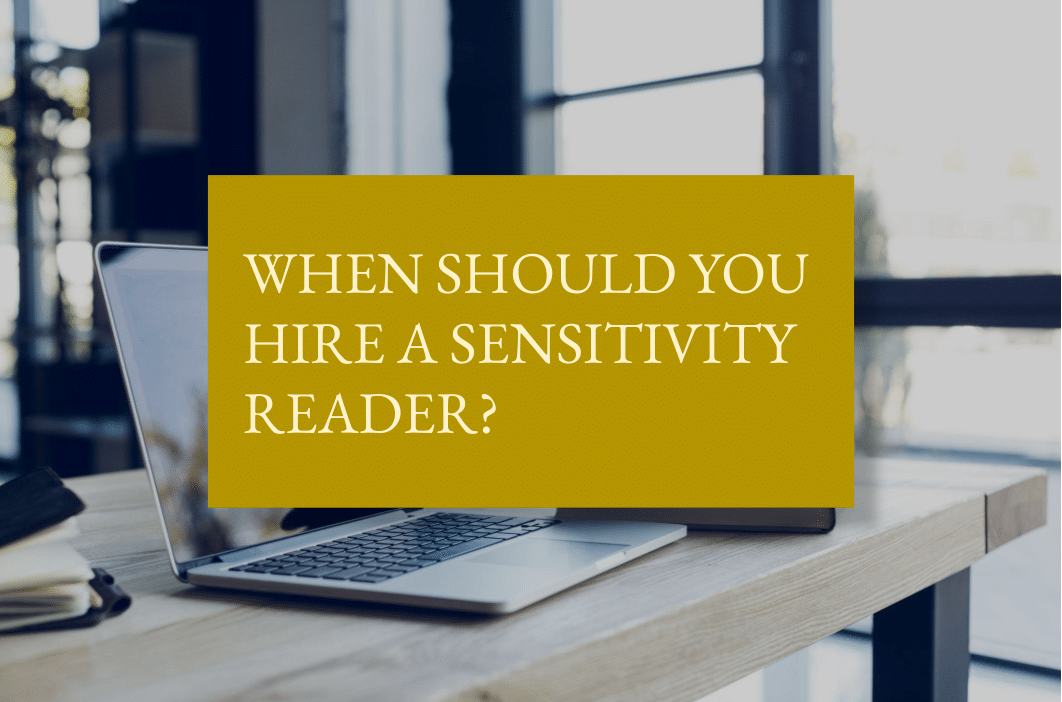
Today’s publishing landscape can be thrilling and rewarding, but it also has some pitfalls for the inexperienced author. One of the hazards you might encounter along the way is judgement for how certain characters are portrayed – especially if these characters come from a culture, background, or belief that’s different from your own. What’s a writer to do?
This is where hiring a sensitivity reader can be a life saver. If this term is new to you, or you’ve heard it around but aren’t sure where to find one, read on for everything you need to know.
What is a “sensitivity reader”?
A sensitivity reader is someone who examines a work from the perspective of a similar background or set of experiences to the characters. Sensitivity readers help flag any unconscious stigmas, biases, or preconceptions, ensuring that the writer doesn’t accidentally include any harmful stereotypes or ideas.
For example, a white author writing about a black protagonist may want to hire a black sensitivity reader to look over their novel. Or an atheist author writing about a character who practices religion might want the opinion of a sensitivity reader from that background. People often don’t realise that they’ve internalised certain tropes from other media, and so they might write something that’s considered hurtful without meaning to.
There are lots of reasons you may want to engage with one of these readers. We’ll look at these in more detail below.
Sensitivity readers vs. beta readers
Sensitivity readers are similar in some ways to beta readers, and so you might be wondering if there’s a real difference.
Beta readers are a test group of readers who represent the general audience for your work. For instance, teen beta readers for a YA novel or horror fans for a horror story. These groups can encompass all sorts of people from all different walks of life. What they have in common is that they’re the sort of readers who would pull your book off the shelf. They’ll offer feedback on things like if your character development felt authentic, if any plot points were confusing, and if the story was resolved in a satisfying way.
Sensitivity readers are less concerned with narrative than they are with accurate representation of certain identities. They’ll point out if a character of their background acts in a way that seems unrealistic, or if a cultural practice is depicted in a way that’s unintentionally insulting. In today’s trigger-happy cancel culture, a sensitivity reader can protect you from anger at something you didn’t even know you were doing.
Do I need to hire a sensitivity reader?
Hiring a sensitivity reader is optional – there’s no diversity rep police that says you can’t publish a book without one. Sensitivity readers are also a relatively new service, and generations of authors did just fine without them. But, it’s worth considering why the demand for them arose when it did.
It’s because the publishing world looks very different than it did twenty or thirty years ago. Literature is seeing a wider range of voices and characters represented in its pages, which is broadly seen as a positive development. But with that comes higher expectations and a higher sense of responsibility for authors.
Working with a sensitivity reader isn’t about following a set of rules or limiting what you can do with your story. It’s about listening to some gentle advice on how to approach a culture with respect. And then, you make the final decision on what advice to apply and what to leave out.
So you don’t have to hire a sensitivity reader before you release a book or seek traditional publication. But there are a few reasons why it’s a good idea. We’ll take a look at those next.
Join our email list for authors
Join our email list for content and opportunities to help you develop your writing, promote your books, and build your author business.
Reasons you might want to hire a sensitivity reader
Now that we have a sense of what a sensitivity reader does, let’s look at some instances where it’s helpful to engage with one before sending your finished book out into the world.
You’re writing about a diverse cast of characters
Life is full of myriad characters, and a good story is no different. It’s arguable that contemporary authors have a responsibility to show a range of people in their work, including various ethnicities, gender identities, beliefs, and more. But it can also be a little intimidating if you’re not sure how to represent all these characters sensitively and accurately.
That’s where a sensitivity reader comes in. They’ll help ensure each of your supporting characters are as authentic and nuanced as those in real life.
Your protagonist is from an identity grouping different from your own
There could be many reasons why you might want to write from the perspective of someone outside your own identity or culture. But because a protagonist’s point of view is so up close and intimate, there are more ways to accidentally go wrong.
If your protagonist is from a different race, gender identity, religion, or sexuality, getting a sensitivity reader on it is a strong choice. Not only will they help you avoid any inadvertently tone-deaf tropes, they’ll help you create a more believable and relatable main character – which is the key to any good story.
You’re drawing from a culture or mythos outside your own
If you’re writing speculative fiction, you may want to explore cultures, folkloric beliefs, or mythologies outside the well-trod tolkien-esque European landscape. How about Chinese mythology? Indigenous American? Latin American? They all have fascinating tales and heroes to explore.
But even if your story takes place in a mythologised world, you’ll want to ensure you’re not falling into clichés seen through a Western lens. Remember, a culture’s mythology is a very important spiritual truth to its people; they’ll want to see that you’ve approached it with respect.
You’re writing about a traumatic experience you’ve never had
Personal identity isn’t the only reason you might want to hire a sensitivity reader. They can also be helpful when you’re writing about characters who have had cataclysmic formative experiences of which you have no first-hand knowledge.
This could include things like sexual or physical assault, growing up in the foster system, unhoused living, hospitalisation, chronic illness, and more. For us as writers, these can be really useful plot devices. But for characters and for people, they shape the way they see the world and themselves. To resonate with your readers, these characters need to be more than simple plot devices.
You’re writing about neurodivergence, disabilities, or mental health issues
Another way people sometimes identify themselves is through variations and limitations in their physical or cognitive makeup. These can be temporary or permanent.
It’s hard to imagine what life is like for someone in a wheelchair, someone who’s lost their vision, or someone who suffers from autism if you haven’t experienced it yourself. It’s wonderful to see more representation for these identities in publishing today; but to ensure you’re portraying them with compassion and authenticity, hiring a sensitivity reader will be really helpful.
You want to show you did the work
Finally, simply being able to show that you’ve worked with sensitivity readers can help buffer you against the judgement and suspicion that can sometimes arise around these kinds of stories.
This shouldn’t be the only reason you hire one, but it’s definitely a positive outcome. Remember to listen to their feedback with an open mind and try your best to do justice to your characters.
Where to find sensitivity readers
Now that we understand why sensitivity readers are so important, where do you go about finding one? Here are a few ideas.
Search for specialist diversity services
Did you know there are businesses and independent editors that specialise in diversity reading? A quick search will unearth several platforms that offer sensitivity readings for aspiring authors. Some will even have multiple readers to choose from, listing traits like their ethnicities, religions, and gender identities so you can work with the one that best fits your story.
These services can be expensive, but it’s because they’re specially trained in what to look for in a manuscript. Many of these readers are also professional editors.
Look at social media and writing communities
A more affordable option is to look into social media groups on platforms like Facebook, Reddit, or Scribophile. There are groups designed to connect writers with independent sensitivity readers, and they’re also a great place to seek out recommendations.
It’s a good idea to start with a sense of how much you’re prepared to spend. Some of these sensitivity readers will have a fixed rate per word or per project, while others will work with you to find a fair price that fits in your budget.
Ask friends, family, and fellow writers
Finally, ask around to see if you can find people whose range of experience suits the characters in your story. Then, see if they’d be willing to review your manuscript, or just answer some questions you might have about how you’ve portrayed your characters.
It’s good practice to either offer an honorarium for their time, or trade a service you can offer such as beta reading their work or making them dinner.
In today’s culture, writing outside your own lived experience can be a little nerve-wracking. But now, you’re armed and informed to write authentic characters that feel alive.
Fija Callaghan is an author, poet, and unapologetic daydreamer. Her work has been shortlisted and longlisted for a number of short story prizes, and you can find her writing in publications like Gingerbread House, Crow & Cross Keys, Corvid Queen, and Mythic Magazine. When not writing or helping other writers get the best out of their work, she can be found haunting her local bookshops or watching the tide come in.
Join our email list for authors
Join our email list for content and opportunities to help you develop your writing, promote your books, and build your author business.
